Munich Travel Guide
Munich is a city unlike any other in Germany and is the heart of Bavarian Gemutlichkeit: the joy to be found in companionship. This beguiling city is also home to enough cultural and historical attractions to captivate even the most experienced travellers. 'We're here for the beer!' could well be the motto of those who holiday in Munich, a perennial favourite with tourists, which hosts the world-famous Oktoberfest beer festival every year. There are many more reasons to travel to Munich, however, besides sampling its renowned brews and enjoying its friendly beer halls, oompah bands and buxom barmaids. The nightlife in Munich will delight year-round but it isn't all this historic city has going for it.
The Bavarian city epitomises traditional charm, in some respects to excess, and there is a lot of old-fashioned hospitality going around. There is also a sophisticated side to Munich, which has numerous impressive museums and art galleries as well as designer stores and world-class restaurants. The city boasts some breath-taking historic architecture and has no shortage of delights for culture vultures and those who enjoy traditional sightseeing. Those who like to buy their way through new cities will also be very happy with the shopping in Munich.
Best time to visit Munich
The busiest time for travel to Munich is during late September for the beer festival, which attracts about six million people every year, but weather-wise the peak tourist season is summer (June to August), when temperatures are warm and mild, though there are frequent thunderstorms. Winters are cold and snowy. The city's proximity to the Alps makes the weather rather unpredictable.
What to see in Munich
-Visit the impressive Alte Pinakothek Gallery to see the work of the old masters.
-See the Hall of Beauties and stroll the lovely grounds of the Nymphenburg Palace.
-Get into science and technology at the Deutsches Museum.
-Admire the historic buildings of Marienplatz.
What to do in Munich
-Enjoy a meal in the revolving restaurant at Munich's Olympic Park.
-Take a sobering tour of the Dachau Memorial Site, the first Nazi 'death camp'.
-Arrange an excursion to the charming alpine village of Berchtesgaden.
-Explore the beautiful scenery and picturesque towns of the Romantic Road.
Beyond Munich
Munich is a great base for exploring the Bavarian Alps, a paradise for hikers, climbers and skiers. Resorts such as Garmisch-Partenkirchen are extremely popular with winter sports enthusiasts, and the striking scenery of lake-side villages like Chiemsee attracts many visitors. Munich is also a natural doorway to the Romantic Road, which winds past fairy-tale villages and castles up to Frankfurt. Stuttgart, which has numerous attractions of its own, is also close to Munich.
Getting there
The Munich International Airport is situated 18 miles (29km) northeast of the centre of Munich, and frequent commuter trains service the airport.
Did you know?
-Eighty percent of Munich's old town centre was destroyed during the war, but much of it has been lovingly restored.
-Munich was founded in 1158 on the lucrative trade route for salt.
-Munich consistently tops opinion polls on the best places to live in Germany.
Things to do in Munich
This charming Bavarian city is a popular tourist destination and a quaint combination of old world allure and modern flair. The city boasts numerous attractions, including some wonderful museums such as the BMW Museum, Deutsches Museum, Museum Brandhorst, the City Museum of Munich and the National Bavarian Museum, to name but a few.
Travellers can head to Marienplatz to see gaze upon historic buildings and marvel at the uniquely German architecture. They can also visit Olympia Park and eat lunch in the revolving restaurant in the tower across the street, enjoying gorgeous views over the city. The Englischer Garten in Schwabing is a great place to relax and unwind in the picturesque gardens, and visit Munich's second biggest beer garden at Chinesischer Turm in the process. Those thirsty travellers coming in autumn can look forward to the world famous Oktoberfest.
For the more adventurous, Munich is also the gateway to the Bavarian Alps and sport enthusiasts from all over the world flock to its slopes for the pristine runs and excellent powder. Football fans can visit FC Bayern Munich's impressive Allianz Arena for a match or a stadium tour that will cover the press conference area, players' tunnel, the FC Bayern Museum and other behind-the-scenes spots.
Visitors planning on doing lots of sightseeing should consider purchasing the CityTourCard, which entitles the bearer to free public transport in Munich and a discount on as many as 70 tourist attractions. Several versions of the card are available.
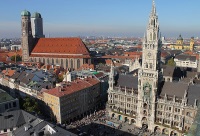
Marienplatz
The Marienplatz is the heart of Munich and the site of its most important historic buildings. The square is dominated by the Gothic Revival Town Hall featuring its famous glockenspiel, both built in the 19th century. The glockenspiel delights visitors when its 43 bells chime daily at 11am, 12pm and 5pm, accompanied by moving figures displaying vignettes from Munich's history. The centre of the square features a statue of the Virgin Mary, while visitors can also explore a toy museum and the Frauenkirche, Munich's cathedral dating from the 15th century. The square is full of great shops and pleasant outdoor eating areas to relax and refuel.
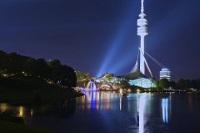
Olympiapark
Munich's massive Olympiapark was constructed for the 1972 Olympic Games but remains a marvel of modern engineering. Its main stadium is crowned with one of the largest roofs in the world, extending 720,000 square feet (66,890 sq metres) and made of tinted acrylic glass. It's designed to collect rainwater used to fill the adjacent Olympic lake. Visitors to the site can enjoy a spectacular view from the revolving restaurant and observation terrace topping the 950-foot (290m) high Olympic Tower. Near the tower is the BMW Museum, which displays the history of Germany's famous automobile manufacturer, while Olympiapark often hosts concerts, sports events and exhibitions.
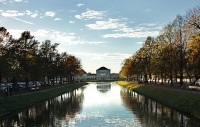
Nymphenburg Palace
Originally a summer home for Munich aristocracy, Schloss Nymphenburg lies five miles (8km) from the city centre. The palace has been expanded, altered and fitted with various eccentricities over the centuries since its construction in 1664. There's a collection of royal coaches on display, a porcelain museum and an arcaded gallery, featuring a collection of 36 provocative paintings ordered by King Ludwig I showing the most beautiful women of his day. The surrounding park has some surprises too, with some interesting pavilions hidden among the English-style gardens. There is information provided in the palace on its history but there are also audio guides available which greatly enrich the experience.
Alte Pinakothek
One of the oldest galleries on the planet, the Alte Pinakothek houses two of the most important collections in Europe. Roughly 700 paintings are on display, featuring the work of many Old Masters from the 14th to the 18th centuries. Highlights include works by Dutch and Flemish masters, as well as Italian giants such as Botticelli, Raphael and Titian. Famous masterpieces in the permanent collection include Rembrandt's Self-Portrait (1629), Raphael's The Canigiani Holy Family (1505), Guido Reni's The Assumption of the Virgin (1642) and François Boucher's Portrait of the Marquise de Pompadour (1756). There are actually three art museums in this beautiful neoclassical building and discounted rates are available to see all three in one day.
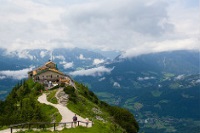
Berchtesgaden
A popular excursion from Munich, Berchtesgaden is perhaps best known for the Eagle's Nest (Kehlsteinhaus), the mountaintop fortress commissioned as a 50th birthday present for Adolf Hitler. It's now an excellent Bavarian eatery, offering breathtaking mountain views. The town itself is a delightful alpine village of winding streets, medieval markets and 16-century architecture. There are a couple of woodcarving museums, with one housed in an old Augustinian monastery. Visitors are enticed to the nearby salt mines of 1517, where they ride on wagons, explore on foot or enjoy the salt lake ferry trip. Berchtesgarten also boasts a world-class ice-skating rink sought after by winter sports enthusiasts, along with plenty of skiing opportunities in the surrounding areas.
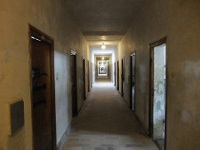
Dachau Memorial Site
Dachau is the site of the first notorious Nazi death camp, where thousands were imprisoned, starved and killed between 1933 and 1945. The camp has now been turned into a museum, containing three memorial chapels. The main camp road still exists, lined with poplar trees. But only two of the original 32 barracks remain, having been rebuilt to illustrate the horrific conditions. The original kitchen, laundry and shower block now contains exhibits, photographs and documents depicting the persecution of Jews and other enemies of the Third Reich. The exhibitions are often personal and include the accounts and stories of prisoners. The memorial is a sobering, sombre experience and may not be suitable for young children.
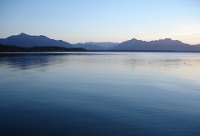
Chiemsee
One of the most beautiful lakes in the Bavarian Alps, Chiemsee boasts two islands and is lined with resorts. A popular weekend excursion in Germany, it can be reached by train from Munich in an hour, or by road via the A8 Autobahn. Visitors can take a steamer cruise around the lake from Prien on the west shore to explore the islands in the lake. The scenery is breathtaking and in summer there is great swimming and sailing to enjoy. Frauenchiemsee is the smaller island and the site of a quaint fishing village with some colourful traditional customs, and a Benedictine nunnery known for its liqueur. The larger island, Herrenchiemsee, bears one of King Ludwig's famous fairytale castles intended to replicate the Palace of Versailles. The centre of the palace still stands, complete with a splendid hall of mirrors and surrounded by gardens and woodland.
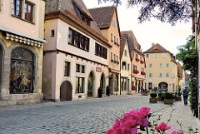
The Romantic Road
A popular route for holidays in Germany, the Romantic Road is a modern concept encapsulating the region's typically Bavarian atmosphere and culture. Guided by multilingual signposts, it's an ideal route for seeing fairytale castles and charming German villages, with the route so popular that the best sites tend to be overrun with tourists in peak summer months. It starts in Wurzburg, a town famous for its wineries and gourmet restaurants. Visitors should be sure to see the Residence Palace, a UNESCO World Heritage Site. From there, the road goes to Rothenburg ob der Tauber and Dinkelsbühl, two of the best-preserved medieval towns in Germany, and the 1,000-year-old Castle Hotel Colmberg. The 2,000-year-old town of Augsburg features beautiful buildings and traditional Bavarian eateries. Pfaffenwinkel and Neuschwanstein are key stops on the route, famous for their churches, castles and pretty rolling countryside.
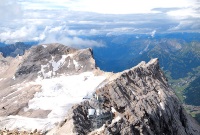
Garmisch-Partenkirchen
Germany's top winter sports destination, Garmisch-Partenkirchen retains the charm of the older Partenkirchen. The pride of the city is the still-running Olympic Ice Stadium and the larger Olympic Ski Stadium. Picturesque and scenic, it's also popular in warmer seasons for hiking and mountain climbing.
There are more than 450 shops in Garmisch-Partenkirchen, including trendy boutiques, sports equipment outlets and craft stores while restaurants and bars found among charming German architecture gives an old-world atmosphere.
Apart from the majesty and beauty of some of Germany's highest mountain peaks, Garmisch-Partenkirchen is also very near to the Partnach Gorge, where the Partnach River surges through a narrow gap between high limestone cliffs, and The King's House, with its alpine botanical garden.
Garmisch-Partenkirchen is not the best for novices, but intermediate and advanced skiers will find plenty to enjoy with both classic and glacial runs in the area. There are about four black pistes, 25 red pistes, 10 blue pistes and three green pistes, as well as a few ski runs above 2,500 metres, meaning snow is assured throughout the season.
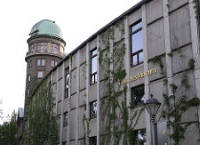
Deutsches Museum
The Deutsches Museum sits on a small island in the Isar River and is the world's largest technology and science museum. Perfect for families exploring Munich, there are some 28,000 artefacts on display, with exhibitions dedicated to themes such as energy, transport, natural sciences communications, music instruments and technology, as well as astronomy, chemistry, electricity, hydraulic engineering and astronautics. There is also a section dedicated to children aged three to eight called Kids Kingdom, featuring hundreds of fun, interactive activities such as a playable giant guitar, enormous building blocks and a fire department. The museum is designed to be accessible and entertaining, even for those who aren't necessarily interested in technology and science.
Eating Out
Visitors should be sure to bring their appetites along when visiting Munich. Eating and drinking are extremely popular activities in this city and travellers will be hard-pressed not to pack on a few pounds with a seemingly endless stream of culinary delights.
Munich is celebrated for its hearty Bavarian fare, with bustling Gaststatten (bistros) the best places to enjoy traditional Bavarian food. Of course, the famous beer halls are great fun and also frequented by locals in droves. Munich has 11 Michelin-starred restaurants, providing sophisticated and creative menus in the city for discerning foodies looking for something a little more high-brow than the grub served in beer halls.
Specialties include Leberkassemmel, a spicy meatloaf; Weisswurst, a veal sausage usually served for breakfast; and Knodels (dumplings). Eating out in Munich is generally quite pricey but that doesn't mean there aren't cheaper alternatives. Visitors also won't struggle to find restaurants in Munich that are open late at night, with some pubs and eateries only closing at 4am.
Promising places to sniff out great local food include the Schwabing district, which overflows with good dining establishments, and the Viktualienmarkt, a square adjoining Marienplatz that hosts a large food market.
Shopping
From trendy local and international designers to traditional Bavarian handicrafts, shopaholics can enjoy plenty of variety in Munich. Typical Bavarian gifts include trachten (traditional clothing) such as Lederhosen, while the most popular souvenirs are still bierkrug (beer steins) and pewterware.
The two main shopping districts are Neuhauserstraße and Kaufingerstraße in Munich's historic city centre. Department and chain stores abound in these pedestrian-only shopping areas selling everything from clothing and accessories to electrical goods and sports equipment. Visitors should head to Maximilianstraße, Theatinerstraße or Leopoldstraße in Schwabing for independent shops and trendy boutiques selling all the latest local designer clothing. Second-hand stores are also found in Schwabing, with real gems hidden among their wares.
The modern Fünf Höfe shopping mall is a great place to find everything under one roof, while the Sunday flea market at Kunstpark Ost provides more alternative buys with second-hand goods, antiques and old bric-a-brac lining the stall fronts. For great food markets, the vibrant Viktualienmarkt behind Marienplatz sells everything from cheese and spices to poultry and game, with the senses coming alive to the fragrances of spices and aromas of delicious produce. The market is open Monday to Friday and features a beer garden where weary shoppers can take a load off, rest their legs and enjoy an ice-cold refreshment.
Most stores are open from Monday to Friday, from 9am to 8pm, and on Saturday until 4pm. Munich is a comparatively expensive city but a rewarding one for shoppers.
Nightlife
From bustling traditional beer halls to vibrant dance clubs, the nightlife in Munich has it all, and the mix of foreigners and locals gives this city a welcoming cosmopolitan feel. Unlike Frankfurt and Berlin, Munich is more known for its bars and beer halls than its nightclubs.
Still, those in search of some serious parties won't struggle to find them in Munich. Sendlinger Tor, Karlsplatz and Odeonsplatz are where many of the city's favourite clubs are concentrated. Other popular nightlife districts in Munich include Schwabing, boasting numerous traditional Bavarian options and lots of live music; Maxvorstand, near the university and frequented by students; the Glockenbachviertel, adored by the most trendy denizens of the city and home to a number of gay and lesbian venues; and the dingy but cheap area around the Munich East Station.
Travellers should note that the friendly, welcoming attitude of the beer halls is not always matched by the more upmarket and fashionable clubs in Munich, where would-be partiers should dress appropriately and anticipate some selectivity from bouncers.
Getting Around
Munich's city centre is a pedestrian zone so many of its attractions are reached on foot, which is also the most pleasant way to explore its more fascinating and historical suburbs. The efficient and integrated public transport system is excellent for getting around. It consists of buses, trams, the U-bahn (subway) and the S-bahn (suburban train) that operate from about 5am to 1am, with hourly buses and trams servicing main routes throughout the night.
Tickets must be validated on entering stations or when boarding. They are transferable between all forms of transport, and last for two hours after being stamped as long as one travels in the same direction. Fares are zone based and the system is well-organised and easy to understand.
There are various day passes available as well as the CityTourCard, which covers all transport within the city and includes discounts to the main attractions. Taxis are safe and convenient, but expensive, while ride-sharing apps are also in operation. Hiring a car is easy but it's often better to use public transport to avoid frustration and confusion. Bicycles are also available for hire at very little cost and are a lovely way to get around.
Munich Climate and Weather
Munich's weather can be unpredictable. In general summers are fairly warm and very wet, characterised by sunny weather interspersed by dramatic thunderstorms. Winters are cold with light snowfalls. In summer (June to August) average temperatures range between 50F (10C) and 73F (23C), and in winter (December to February) average temperatures range between 25F (-4C) and 39F (4C). The Alps cause two unique aberrations in Munich weather. Southwesterly winds crossing the Alps can push up temperatures markedly even in winter, while northwesterly winds blowing from the mountains bring unseasonably low temperatures, rain and even snow on odd days. Visitors can easily end up experiencing quite a variety of weather on a stay in Munich. The most popular time to visit is in September and October, for Oktoberfest, but summer is the peak tourism season. Munich is really a year-round holiday destination because so many of the city's attractions can be enjoyed regardless of the weather.
Germany travel info
Electricity
230 volts, 50Hz. European-style two-pin plugs are standard.
Language
German is the official language. English is also widely spoken and understood.
Money
The unit of currency is the Euro (EUR), divided into 100 cents. ATMs and exchange bureaux are widely available. The major credit cards are widely accepted in large shops, hotels and restaurants. The quickest and most convenient way to change money is to obtain cash from one of the ATMs that are ubiquitous features on all German streets. Banks are closed on weekends, but exchange bureaux at airports and main railway stations are open daily.
Tipping
German law stipulates that all prices, menus and bills include both tax and a service charge, so tipping is not necessary in restaurants. Cleaning staff, hairdressers, taxi drivers and other menial services appreciate small tips.
Health
There are no serious health risks for visitors to Germany and no vaccinations are required. The German health service is excellent and there is a reciprocal health agreement with most EU countries, whose citizens are entitled to free medical and dental treatment on presentation of a European Health Insurance Card (EHIC). After Brexit, the Global Health Insurance Card (GHIC) replaced the European Health Insurance Card (EHIC) for UK citizens. The GHIC allows UK citizens access to state healthcare during visits to the EU. The GHIC is not valid in Norway, Iceland, Liechtenstein or Switzerland, nor is it an alternative to travel insurance. Nationals of other countries should take out travel insurance.
Safety
A visit to Germany should be trouble free, but visitors should take normal precautions to avoid mugging, bag-snatching and pick-pocketing, especially at airports, railway stations and markets in the large cities.
Local customs
Visitors are not required to carry their passports with them at all times in Germany, but carrying some form of identification is advised. Smoking in public places such as bars and restaurants is illegal.
Doing business
In Germany, business is conducted in a formal manner, with a conservative and formal dress code being the norm. Punctuality is vital at all meetings and it's considered rude to be late. Germans use titles often, with men referred to as 'Herr' and women as 'Frau', followed by their last names.
Meetings are often purely business and may not occur over lunches, which are generally more social. Shaking hands at the beginning and end of the meeting is common. Business hours are generally 9am to 6pm Monday to Friday, with an hour taken over lunch.
Duty free
Passengers arriving from EU countries can enter Germany without paying duty on 800 cigarettes or 400g cigarillos or 200 cigars or 1kg tobacco; 90 litres of still wine; 110 litres of beer; and 10 litres of alcohol stronger than 20 percent or 20 litres of fortified wine, sparkling wine or other liqueurs up to 22 percent.
Passengers arriving from non-EU countries, over the age of 17, can enter Germany without paying duty on 200 cigarettes or 100 cigarillos or 50 cigars or 250g smoking tobacco; 4 litres of wine and 16 litres of beer and 1 litre of spirits over 22 percent volume; or 2 litres of spirits under 22 percent volume. Other goods to the value of €430 for travellers arriving by air or sea, and €300 for travellers arriving by land.
Communications
The international access code for Germany is +49. Travellers will find it easy to use a local SIM card, Skype, WhatsApp or similar apps. Free WiFi is available in most hotels, cafes and restaurants.
Passport & Visa
The borderless region known as the Schengen Area includes the following countries: Austria, Belgium, Czech Republic, Denmark, Estonia, Finland, France, Germany, Greece, Hungary, Iceland, Italy, Latvia, Lithuania, Luxembourg, Malta, The Netherlands, Norway, Poland, Portugal, Slovakia, Slovenia, Spain, Sweden, and Switzerland. All these countries issue a standard Schengen visa that has a multiple entry option, and which allows the holder to travel freely within the borders of all the aforementioned countries. Additionally, non-EEA members require proof of onward or return tickets, the necessary travel documentation for their next destination, and sufficient funds to support themselves while in Germany. Citizens of Australia, Canada, Israel, Japan, New Zealand, Switzerland, and the USA are exempt from the requirement to hold onward tickets.
It is highly recommended that travellers' passports have at least six months' validity remaining after the intended date of departure from their travel destination. Immigration officials often apply different rules to those stated by travel agents and official sources.
Entry requirements
US citizens must have a passport that is valid for three months beyond the intended period of stay in Germany (and issued within the last 10 years). A visa is not required for stays of up to 90 days within a 180-day period.
UK citizens must have a passport that is valid for three months beyond the intended period of stay in Germany (and issued within the last 10 years). A visa is not required for stays of up to 90 days within a 180-day period.
Canadian citizens must have a passport that is valid for three months beyond the intended period of stay in Germany (and issued within the last 10 years). A visa is not required for stays of up to 90 days within a 180-day period.
Australian citizens must have a passport that is valid for three months beyond the intended period of stay in Germany (and issued within the last 10 years). A visa is not required for stays of up to 90 days within a 180-day period.
South African citizens must have a passport that is valid for three months beyond the intended period of stay in Germany, with at least two blank pages, and must obtain a valid Schengen visa prior to travel.
Irish citizens must have a passport that is valid for three months beyond the intended period of stay in Germany (and issued within the last 10 years). A visa is not required.
New Zealand citizens must have a passport that is valid for three months beyond the intended period of stay in Germany (and issued within the last 10 years). A visa is not required for stays of up to 90 days within a 180-day period.
Useful contacts
German National Tourist Board, Frankfurt: +49 (0)69 751 903 or www.germany-tourism.de
110 (Police); 112 (Ambulance/Fire)


